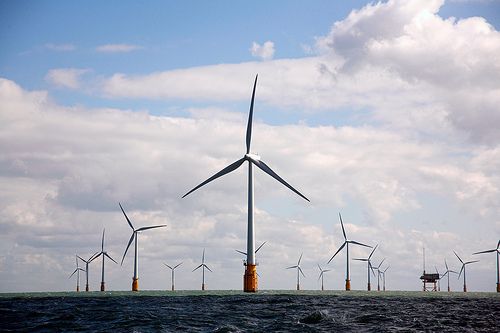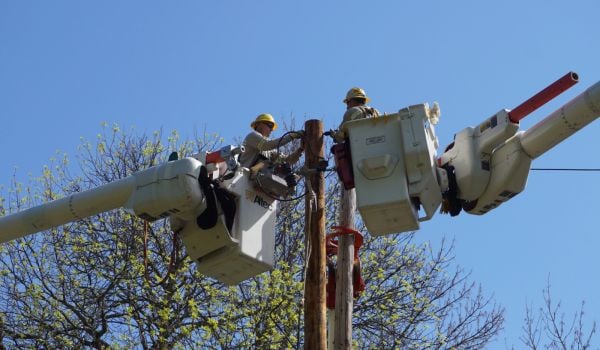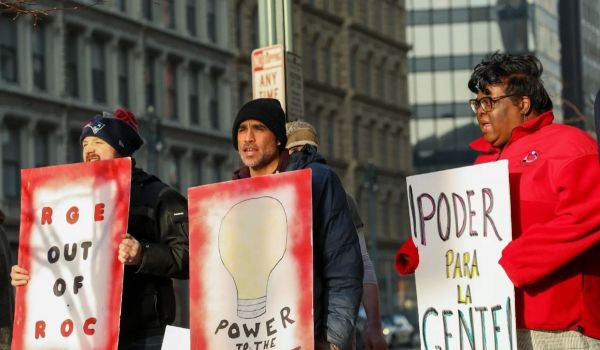This piece originally ran on NJ Spotlight.
For the second time this month, a consultant retained by the state has determined that an offshore wind farm proposed for three miles off the coast of Atlantic City has failed to justify the economic benefits of moving forward.
The findings place big new hurdles in front of the Fishermen’s Atlantic City wind farm, the most advanced of several offshore projects vying to build wind turbines to produce pollution-free electricity along the coast of New Jersey.
Perhaps more importantly, the report seems to reinforce a commitment made by the Christie administration that any offshore wind farm project financed with subsidies from electric and gas customers must produce “a net economic benefit”—a barrier proving difficult to surmount.
The Christie administration has repeatedly said it wants New Jersey to be the center of the offshore wind industry on the eastern seaboard, claiming that could create thousands of well-paying green jobs in the sector. Its efforts mirror proposals by the federal government to do the same. Eleven developers have expressed interest in building wind farms off the Jersey coast.
The latest report, done by a pair of consultants for the New Jersey Board of Public Utilities, is less harsh in its assessment of the 25- to 30-megawatt wind farm proposal than one done earlier by a consultant retained by the state Division of Rate Counsel. Nonetheless, it underscores how much work the developer needs to do to convince the BPU, which ultimately will decide the fate of the proposal, to allow the pilot project to move forward.
The consultants, Boston Pacific, a Washington D.C.-based firm and OutSmart, a Dutch firm specializing in offshore wind farms, did not recommend that the project be rejected, but repeatedly emphasized many of the assumptions made by the developers were lacking in crucial details.
“Net benefits of the project were not demonstrated because key underlying assumptions of applicants’ cost-benefit analysis were not adequately substantiated,” according to the consultants.
Among their chief criticisms, the consultants said the applicants failed to address the possibility of a negative job impact caused by consumers paying above market prices for power from the wind farms, compared with electricity from conventional power plants.
They also questioned the positive job impacts suggested by the developers that would result from increased tourism to Atlantic City to see the wind turbines, a criticism echoed by the Rate Counsel’s consultant.
“It’s a little bit less critical, but it is really reaching the identical conclusion,” said Stefanie Brand, director of the Division of Rate Counsel, referring to the two reports. “They picked up on the same things we did.”
As in the previous consultants’ report, most of the key financial details of the Fishermen’s Energy project were redacted. More importantly, the price of offshore renewable energy credits (ORECs), which the company would collect for the electricity the wind farm produces, was not disclosed.
That information is crucial because ratepayers will end up paying those credits off, over the 20-year life of the project. The consultant noted that the credits will begin at a fixed price (redacted) and then escalate (redacted). State officials have justified keeping that information confidential, saying that disclosing it would create a competitive advantage for other offshore wind farm developers.
Still, ratepayers could end up paying steeply to develop cleaner ways of producing electricity. Brand’s consultant projected the Atlantic City wind farm would increase rates between $15 million and $37 million a year, or $286 million over 20 years.
In the past, Brand has projected that consumers could end up paying $5 billion in subsidies over the next two decades to support New Jersey’s aggressive efforts to promote solar and wind power.
The BPU’s consultant did not provide any precise numbers, but suggested the subsidy sought by Fishermen’s Energy is higher than necessary. “One culprit might be the small scale of the project,” according to the consultant.
The Fishermen’s Energy project is designed to be the first phase of a larger, 1,100-megawatt project that would build wind turbines farther off the coast. Most of the other offshore wind projects are on a larger scale, with farms located 16 miles or more off the Jersey coastline.
Fishermen’s Energy executives were not discouraged by the latest consultants’ report. “Unequivocally, we will substantiate the benefits [of the project],” said Chris Wisseman, the newly hired chief executive officer at Fishermen’s. Ironically, his hiring was mentioned in the consultant’s report, but his name was redacted, even though subsequent biographical information made it clear they were referring to him.
“We’re working hard to get a submission to clearly demonstrate the benefits of this project,” Wisseman said. “They’ve asked for a lot of information; a lot of it is just at our fingerprints.”
Matt Elliott, clean energy advocate for Environment New Jersey, said he worried the state’s tough net economic benefit analysis relied too heavily on economic data at the expense of environmental benefits.
“There are environmental benefits of creating energy without any pollution,” he said. “I worry we don’t count the benefits of reducing our dependence on fossil fuels.”
Click here for a previous post on the ongoing debate over wind farms off the coast of New Jersey.
















